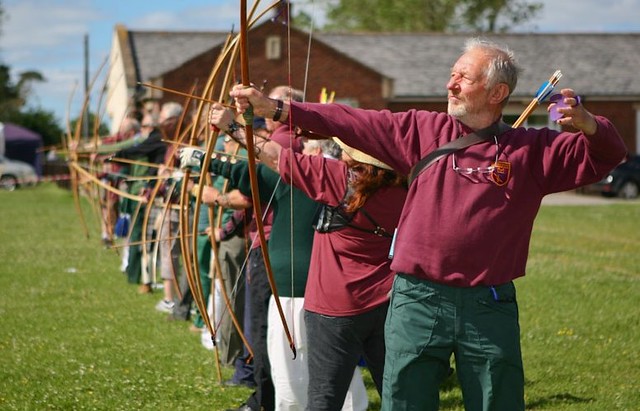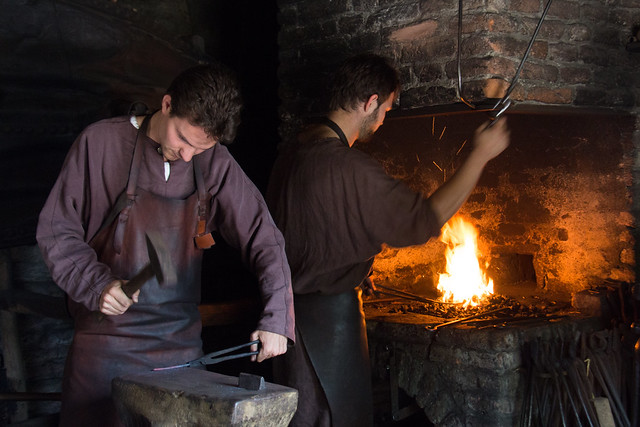Today we’re looking at the words for walls, weirs and related things in Celtic languages.

| Irish (Gaeilge) |
balla [ˈbˠal̪ˠə] = wall
cúlbhalla = back wall
idirbhalla = party wall
uchtbhalla = parapet |
| Scottish Gaelic (Gàidhlig) |
balla [bal̪ˠə] = wall
balla-tòin = back wall
balla-tarsainn = partition (wall)
balla-dìon = protective wall, safety barrier |
| Manx (Gaelg) |
boalley = bulwark, dyke, wall
boallee = to wall, enclose, impale
boallit = walled, dyked, enclosed |
| Middle Welsh (Kymraec) |
wal/gwal = wall |
| Welsh (Cymraeg) |
(g)wal [(ɡ)wal] = wall
walio = to wall |
| Middle Cornish |
gwal = wall |
Etymology: from the Old English weall (wall, dike), from the Proto-Germanic *wallaz / *wallą (wall, rampart, entrenchment), from the Latin vallum (rampart, military wall), from vallus (stake, pallisade, point), from the Proto-Indo-European *welH-/*wel- (to turn, wind, roll) [source].
Words from the same roots include wall, wallow, well and valve in English, wal (coast, shore, earthen levee) in Dutch, Wall (rampart, parapet, earthwork, levee, embankment) in German, valla (fence, barricade, obstacle) in Spanish, and vall (moat) in Catalan [source].
| Old Irish (Goídelc) |
múr = wall |
| Irish (Gaeilge) |
múr [mˠuːɾˠ] = wall, rampart, pile, building, dwelling, bank, mound, heap, mass, shower, profussion, abundance
múrach = having walls, walled, mural
múrdhathadóireacht = wall-painting
múr báistí = rain-cloud, heavy fall of rain
múr cathrach = city wall
múr ceo = bank of fog
múr tine = wall of flame, conflagration |
| Scottish Gaelic (Gàidhlig) |
mùr [muːr] = (defensive) wall, rampart, fortification |
| Proto-Brythonic |
*mʉr = wall |
| Old Welsh |
mur = wall |
| Middle Welsh (Kymraec) |
mur = wall |
| Welsh (Cymraeg) |
mur [mɨːr/miːr] = wall, rampart, fortification, defender
murio = to build (a wall) to wall, fortify, lay bricks or stones
muriog = walled, fortified, wall-like, defensive
murlen = poster, placard
murlun = mural, frieze |
| Breton (Brezhoneg) |
mur = (exterior) wall |
Etymology: from the Latin mūrus (wall), from the Proto-Italic *moiros, from the Proto-Indo-European *mey- (to fix, to build fortifications or fences) [source].
Words from the same roots include mere (boundry, limit) in English, mur (wall) in French, muro (wall) in Italian, and muur (wall, barrier) in Dutch [source].
| Proto-Celtic |
*wraga = ? |
| Gaulish |
*brāca = ? |
| Old Irish (Goídelc) |
fraig = wall (interior) |
| Irish (Gaeilge) |
fraigh = (interior of) wall, rafters, roof
fraighfhliulch = damp-walled, damp from contact with a wet wall (of clothes)
fraighleach = roofing, rafters |
| Scottish Gaelic (Gàidhlig) |
fraigh [frɤj] = partition, partitioning wall, border, edge, fringe, shelf
fraighnidh [frɤin̪ʲɪ] = water oozing through a wall |
Etymology: unknown
| Middle Welsh (Kymraec) |
paret, parwyt = wall |
| Welsh (Cymraeg) |
pared = wall, surface of a wall, dividing-wall, partition |
| Old Cornish |
poruit = wall |
Etymology: from the Latin pariēs (the wall of a house or room). Words from the same roots include parete (wall, side, surface) in Italian, pared (wall) in Spanish, and paroi (inner wall, inside surface, side) in French [source].
| Proto-Celtic |
*koret = palisade, wall |
| Old Irish (Goídelc) |
cora = weir |
| Middle Irish (Gaoidhealg) |
cora = stone fence, weir |
| Irish (Gaeilge) |
cora [ˈkɔɾˠə] = weir, rocky crossing-place in river, rocky ridge extending into sea or lake
cora éisc = fish weir
cloch chora = stepping-stone |
| Scottish Gaelic (Gàidhlig) |
caradh [karəɣ], cairidh [karʲɪ] = weir, mound (in a body of water)
cairidh-iasgaich = fishing weir |
| Middle Welsh (Kymraec) |
kored, cored, coret = weir, dam, fishgarth |
| Welsh (Cymraeg) |
cored = weir, dam |
| Old Breton |
kored / gored = fish weir |
| Breton (Brezhoneg) |
kored = fish weir |
Etymology: uncertain – possibly related to the German word Hürde (hurdle) and/or the Old English word *hyrd (framework, door), which is the root of the English word hurdle.
The usual word for wall in Cornish is fos, which is cognate with words for ditch in other Celtic languages. See Ditches and Trenches.
Another word for wall in Breton is moger. See Fields, Meadows and Pastures.
Words marked with a * are reconstructions.
Sources: Wiktionary, Am Faclair Beag, Online Manx Dictionary, Teanglann.ie, eDIL – Electronic Dictionary of the Irish Language, In Dúil Bélrai English – Old Irish glossary, Geiriadur Prifysgol Cymru, Gerlyver Kernewek, Gerlyvyr Cernewec, Dictionaire Favereau, TermOfis, Le dictionnaire diachronique du breton, Geriafurch, English – ProtoCeltic WordList (PDF), Etymological Dictionary Of Proto Celtic







